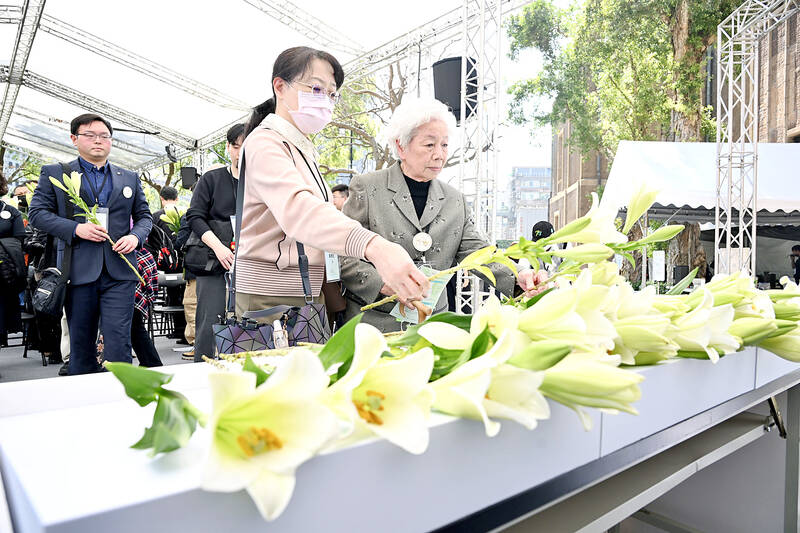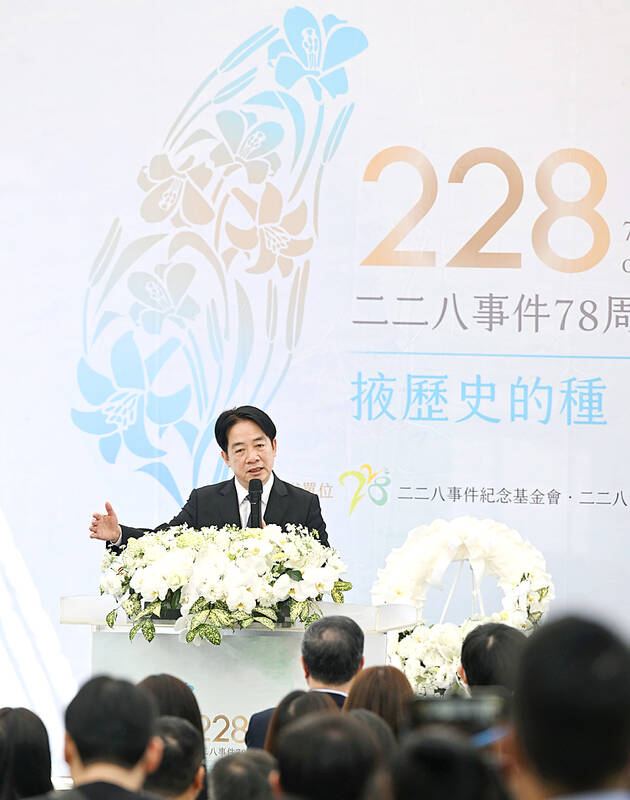President William Lai (賴清德) yesterday pledged to double down on efforts to disclose political archives on past wrongdoing by the state as he apologized for the 228 Incident and the Lin family murders on behalf of the country.
Yesterday marked the 78th anniversary of the 228 Incident, also known as the 228 Massacre, a crackdown launched by the then-Chinese Nationalist Party (KMT) regime against civilian demonstrations following an incident in Taipei on Feb. 27, 1947.
The ensuing massacre and imposition of martial law marked the beginning of the decades-long White Terror era, during which thousands of Taiwanese were arrested, imprisoned and executed. Historians estimate as many as 30,000 people were killed.

Photo: Lo Pei-te, Taipei Times
The Lin family murder case refers to the killing of democracy campaigner Lin I-hsiung’s (林義雄) 60-year-old mother and seven-year-old twin daughters on Feb. 28, 1980. The murderer has never been apprehended. However, Lin and many Taiwanese believe the killings were politically motivated.
Lai in his address at the National 228 Memorial Museum in Taipei yesterday commemorating the 228 Incident said it was his first time attending the event in his capacity as president and that he would again apologize for the 228 Massacre on behalf of the government, as well as pay tribute to every martyr who was courageous enough to rise up against the authoritarian regime.
He also expressed condolences to people who died in the Incident and sent regards to the survivors.

Photo: Lo Pei-te, Taipei Times
“Greetings to all family members of the affected individuals. My heart stays with you,” Lai said.
Speaking of the 228 Incident, Lai said the tragedy was not triggered by ethnic conflicts, nor do those who commemorate the event 78 years later seek to provoke them.
Any attempt to reduce the Incident and its memorials to such a narrative is “irresponsible” and “unacceptable,” he said.
Family members of the martyrs would not be fully consoled and reconciliation would not be truly achieved in society should the historical truths remain buried and unsolved, Lai said.
“Uncovering historical truths is not easy,” he said, citing the case of the Lin family murder.
“Recent studies and examinations showed that the then-government must have been involved in the murders and that intelligence agencies did interfere with the investigation into the case by damaging critical evidence,” he said, adding that the government cannot escape the blame for the murders.
“Today, I apologize to the Lin family on behalf of the government,” he said.
The government would step up declassifying political documents to unveil 228 historical truths, Lai said.
Lai said he has instructed the National Security Bureau to examine the nearly 1 million pieces of data it possesses to manually uncover the political documents.
The examination process would be completed by May with the documents handed to the National Archives Administration in June for review, publication and further investigation, he added.
He said the government would also implement transitional justice by preserving more historical sites of transitional justice significance, such as the Gikong Presbyterian Church in Taipei — the site of the Lin family murders.
The commemoration of the 228 Incident would continue to be held annually, he added.
“The anniversary ceremony of the 228 Incident is held not only to commemorate the martyrs, console their family and relieve the pain, but also to remember history to avoid repeating it,” Lai said.
Additional reporting by CNA

‘FORM OF PROTEST’: The German Institute Taipei said it was ‘shocked’ to see Nazi symbolism used in connection with political aims as it condemned the incident Sung Chien-liang (宋建樑), who led efforts to recall Democratic Progressive Party (DPP) Legislator Lee Kun-cheng (李坤城), was released on bail of NT$80,000 yesterday amid an outcry over a Nazi armband he wore to questioning the night before. Sung arrived at the New Taipei City District Prosecutors’ Office for questioning in a recall petition forgery case on Tuesday night wearing a red armband bearing a swastika, carrying a copy of Adolf Hitler’s Mein Kampf and giving a Nazi salute. Sung left the building at 1:15am without the armband and apparently covering the book with a coat. This is a serious international scandal and Chinese

PERSONAL DATA: The implicated KMT members allegedly compiled their petitions by copying names from party lists without the consent of the people concerned Judicial authorities searched six locations yesterday and questioned six people, including one elderly Chinese Nationalist Party (KMT) member and five KMT Youth League associates, about alleged signature forgery and fraud relating to their recall efforts against two Democratic Progressive Party (DPP) legislators. After launching a probe into alleged signature forgery and related fraud in the KMT’s recall effort, prosecutors received a number of complaints, including about one petition that had 1,748 signatures of voters whose family members said they had already passed away, and also voters who said they did not approve the use of their name, Taipei Deputy Chief Prosecutor

UNDER ATTACK: Raymond Greene said there were 412 billion malicious threats in the Asia-Pacific region in the first half of 2023, with 55 percent targeting Taiwan Taiwan not only faces military intimidation from China, but is also on the front line of global cybersecurity threats, and it is taking action to counter those attacks, President William Lai (賴清德) said yesterday. Speaking at the opening of this year’s Cybersec Expo in Taipei, the president assured foreign diplomats and exhibitors that Taiwan remained committed to strengthening its defense against cyberattacks and enhancing the resilience of its digital infrastructure. Lai referenced a report from the National Security Bureau (NSB) indicating that the Government Service Network faced an average of 2.4 million intrusion attempts daily last year, more than double the figure

Retired US general Robert B. Abrams reportedly served as adviser to Chief of the General Staff Admiral Mei Chia-shu (梅家樹) during the Ministry of National Defense’s computer-simulated war games in the buildup to this year’s 41st annual Han Kuang military exercises, local media reported yesterday. For 14 days and 13 nights starting on April 5 and ending yesterday, the armed forces conducted the computer-simulated war games component of the Han Kuang exercises, utilizing the joint theater-level simulation system (JTLS). Using the JTLS, the exercise simulated a continuous 24-hour confrontation based on scenarios such as “gray zone” incursions and the Chinese People’s Liberation